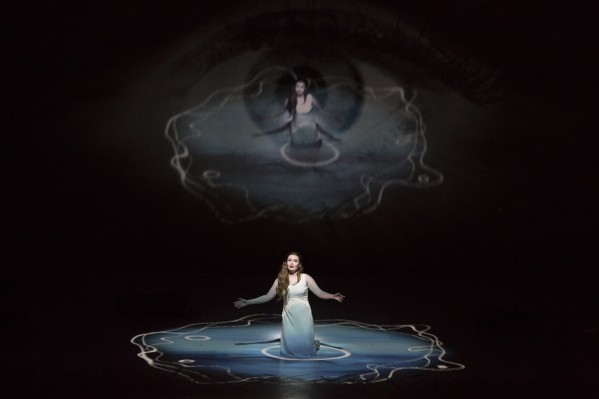
Projections work best to evoke setting more than they do to create mood in ‘Iolanta.’ (Photo by Marty Sohl/Dallas Opera)
Iolanta, Tchaikovsky’s one-act lyric fairy tale, has long been popular in its native Russia, though not often performed elsewhere. The Dallas Opera, therefore, made an unusual choice in introducing this work as the concluding entry in its current season, but the risk paid off with this inventive and satisfying production.
Princess Iolanta (wonderful soprano Ekaterina Scherbachenko) lives a contented but sheltered life in the mountains of southern France, hidden away from her subjects. She is blind, and her father, King Rene (portrayed with pathos as well as strength by bass Mikhail Kolelishvili), has forbidden her caretakers — Bertrand (powerful bass Jordan Bisch) and Marta (standout mezzo-soprano Tamara Mumford) — from mentioning anything in her presence about vision or light. As a result, poor Iolanta has no idea that anyone in the world has sight, believing that eyes are only for crying.
King Rene desperately wants to find a cure for his beloved daughter’s blindness, so he brings renowned Moorish doctor Ibn- Hakia (excellent baritone Vladislav Sulimsky) to their mountain home. The doctor delivers his hopeful prognosis (via the mystical aria “Two worlds”), explaining that Iolanta may be cured of her blindness, but only if she has the desire to see, which necessitates informing her of the gift of sight. The ever-protective King, however, refuses to let her know about her blindness, ordering anyone executed who violates his decree.
Robert, Duke of Burgundy (fine baritone Andrei Bondarenko) and his friend Count Vaudemont (fantastic tenor Sergey Skorokhodov) accidentally stumble upon the beautiful gardens that hide the princess. Robert has been betrothed to Iolanta since a young age, but admits that he has fallen with another in the lovely Matilde instead (“Who can compare to my Matilde?”). Vaudemont sees the princess sleeping and is immediately enthralled by her, but Robert runs for help, fearing that they are in danger. Vaudemont and Iolanta fall in love, during which time he accidentally reveals the secret of Iolanta’s condition to her.
Will Vaudemont be beheaded? Will Iolanta ever see his face? Will the King’s heart soften? In opera, you can never tell, but hey: It’s a fair tale. Still, it’s sentimental even for Russian opera, and more than a touch sanctimonious.
This modern production, directed by Christian Räth, relies heavily on light projections to convey not only the setting but also the mood. The projections (designed by Elaine J. McCarthy) effectively set the various scenes, but are distracting when used decoratively. The costumes, recreating early 20th century fashions via designer Susan Cox, demonstrate a great attention to detail. Though conducted energetically by Emmanuel Villaume, the orchestra, particularly winds, sounded muddled during several technical passages. Despite being in the back of the orchestra pit, the chorus projected powerfully. And at compact 90 minutes, Iolanta is worthwhile.
Performs tonight and Saturday at 7:30 p.m.
— Alicia Chang















